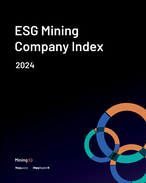This article is 5 years old. Images might not display.
ASM said it produced about 30 kilogrammes of alloy with the patented reduction process at the South Korean plant, which met its commissioning milestone on time and budget.
It is the first phase of the technology's development, with the ultimate goal a low emission, high purity metal refining technology that can be applied to zirconium, titanium, rare earths for permanent magnet alloys. As energy costs in metal production commonly range from 30-40% of total costs, the optimisation is a significant cost benefit that ASM said it will further optimise as its metallisation programme progresses.
In the next phase, the alloy will be used to produce a 99.9% purity titanium metal using the Electro refining process. Commissioning for the electrorefining portion of the facility is scheduled for this month, and future runs will include neodymium and praseodymium production as well as other rare earths in metallic form.
"This is a significant milestone in the development of our integrated business plan that includes clean metal production from the development of the Dubbo project in New South Wales," Australian Strategic Materials managing director David Woodall said.
"The clean metal technology can be applied to all the products from the Dubbo project. This has the potential to add significant value to our Australian project, while ensuring supply security and stability of these critical materials to global and domestic Australian manufacturing sectors.'
The titanium metal alloy production, he added, is a first step in its strategy: adding value to the polymetallic mine's output: "ASM's investment in downstream processing will improve the economics of its Dubbo project, as well as ASM leading the worldwide commercialisation of this breakthrough metallising technology."
ASM was created as a holding company for the Dubbo project. It is a wholly owned subsidiary of Alkane Resources.
























